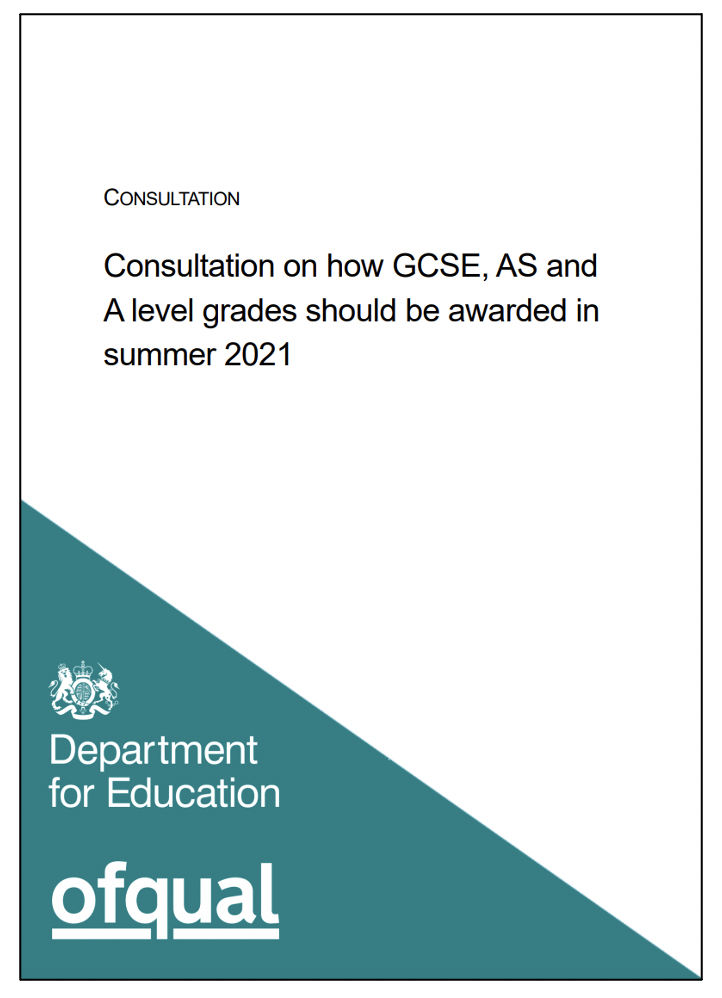
Ofqual’s consultation sets out options for assessing this summer’s GCSEs and A-levels following the cancellation of exams. The deadline for responses is January 29th. Students and parents can submit responses and we would encourage you to do so.
You can find it here https://www.gov.uk/government/consultations/consultation-on-how-gcse-as-and-a-level-grades-should-be-awarded-in-summer-2021
There are a number of important questions to be resolved, particularly around exactly how proposed externally-set papers taken in the summer term will work and provide fairness and consistency for students.
We understand that there are confusing messages for parents and Year 11/13 students at present about exams being cancelled/whether some kind of mini-exam will actually go ahead. We have outlined the key points from the consultation document below to try and clarify for parents and students exactly what is being proposed/suggested.
Suggested timeline from Ofqual (NOT what has been agreed but a proposal only):
Jan – May Y11 and Y13 Students continue their academic studies
May/ early June Teachers make final assessments about students’ performance (possibly through use of a selection of exam board provided papers)
Early – mid June Papers marked, internal quality assurance process, grade evidence organised and recorded
Mid June Grades submitted to exam boards
June External quality assurance by exam boards throughout June
Early July Results released to students
July onwards Appeals process
Summay: what does the Ofqual consultation document say?
How will grades be determined/awarded?
Grades this year should be based on teachers’ assessments of the evidence of the standard at which their students are performing … and should indicate their demonstrated knowledge, understanding and skills.
Teachers should assess students on the areas of content they have covered and can demonstrate their ability, while ensuring sufficient breadth of content coverage so as not to limit progression.
Teachers should be able to use evidence of the standard of a student’s performance from throughout their course (including NEA).
A breadth of evidence should inform a teacher’s assessment of their student’s deserved grade.
How will grades be standardised?
Exam boards could provide … papers which teachers could use to assess their students – consultation is asking whether the use of these papers should be optional or mandatory.
Papers would be marked by teachers.
Exam boards could also sample teachers’ marking as part of the external quality assurance arrangements and to seek to ensure this was comparable across different types of school and college.
The set of papers provided by the exam boards should cover a reasonable proportion of the content and teachers should also have some choice of the topics on which their students could answer questions. Students should be assessed across a range of content.
Teachers should record the evidence on which they base their decision for each student.
What about NEA (coursework)?
Teachers should take account of the standard of the student’s non-exam assessment in their final assessment. Students should not be penalised if they have been unable to complete their non-exam assessment for reasons beyond their control. Teachers should mark non-exam assessments, however the exam boards should not be required to moderate their marking this year.
What about other evidence?
If teachers do not use the exam board set papers, or even where they do, they should use additional ways to assess students and to gather evidence of the standard at which their students are performing.
Where teachers devise their own assessment materials, they should be comparable in demand to the papers provided by the exam boards.
Teacher devised assessments used to support the final assessment should be used at the same time as the exam board papers would be taken.
Ofqual propose that other sources of performance evidence could include:
• formal tests
• mock examination results
• substantial candidate work (which relates to the qualification specification, and where the school or college are confident it was completed without support / external support)
What about appeals?
Teachers should not tell students the grade they have submitted to the exam boards on their behalf.
Once results have been issued a student who believes their teacher has made an error when they assessed their performance in 2021 should be able to appeal to their school or college on that basis. Appeal process should include:
-Review of marked papers
-Review of NEA
-Review of any other evidence used to support submitted grade decision
The outcome of the teacher assessment should only be changed if the person undertaking the appeal found that the outcome was not legitimate.
A student should also be able to appeal further to the exam board (on the grounds that the school or college had not acted in line with the exam board’s procedural requirements).